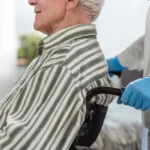
How is Osteoporosis Diagnosed? – A Guide for Patients
June 6, 2025
Why Do Elderly Parkinson’s Patients Need Geriatric Expertise?
August 7, 2025As our loved ones grow older, their healthcare needs become more complex and unique. Ageing is a natural part of life, but it often comes with a set of medical, emotional, and social challenges. That’s where geriatric care is a specialized department of medicine focused on promoting health and well-being in older adults. Choosing the right geriatric clinic can make all the difference in ensuring they receive the care, respect, and attention they truly deserve.
If you’re searching for a “geriatrician near me” or if you’re trying to understand what a geriatrician does, it’s equally important to know why choosing the right one matters; finding the best clinic is key to making a well-informed decision.
What Is Geriatric Care and Why Is It Important?
Geriatric care is a specialized medical approach designed for individuals typically aged 60 and above. It considers the complexities of ageing, such as multiple chronic conditions, polypharmacy (multiple medications), and decreased physical or mental functioning. Unlike general practitioners, geriatricians are trained to provide personalized and exhaustive care for older adults, often focusing on quality of life rather than just treating illness.
Choosing a geriatric clinic that understands these complexities ensures that your loved ones receive care at their stage of life.
What Does a Geriatrician Do? Understanding Their Roles
Understanding the roles of geriatricians helps you appreciate the value they bring to elderly care. A geriatrician is more than just a doctor for seniors; they support seniors in ageing well. Their roles typically include:
- Complete Health Assessments: They evaluate physical, mental, emotional, and functional health.
- Medication Management: They review and optimize medication plans to avoid harmful interactions and side effects.
- Chronic Disease Management: They handle complex health issues like diabetes, hypertension, arthritis, and dementia.
- Fall Risk and Mobility Assessments: They help prevent injuries and support safe movement and independence.
- Coordination of Care: They often work with family members, caregivers, physiotherapists, and social workers to ensure holistic support.
- Care of the bedridden patient: Maintaining hygiene, monitoring nutrition, and providing emotional support are also essential for their overall well-being.
Why the Right Geriatric Clinic Makes a Difference
Personalized, Compassionate Care
Not all clinics are made equally. The right geriatric clinic provides more than routine medical checkups; it offers an environment of understanding and respect. Elderly patients may feel anxious, frustrated, or even ignored in general healthcare settings. A good geriatric clinic takes time to listen, builds trust, and focuses on the elder patient, not just a set of symptoms.
Early Detection of Health Issues
Ageing can mask certain symptoms, and what might seem like “normal ageing” could be an underlying condition. Experienced geriatricians are trained to notice these minute changes and potentially prevent hospitalizations or serious complications.
Better Medication Safety
Older adults are more likely to be on multiple medications, which can increase the risk of side effects or harmful drug interactions. The right clinic will have protocols for careful medication review and adjustment, which can improve health outcomes and reduce unnecessary prescriptions.
Support for Family and Caregivers
The impact of ageing expands beyond the individual. It affects families and caregivers, too. A reliable geriatric clinic offers counselling, education, and resources to help families cope, understand care plans, and make informed decisions.
Integrated Services Under One Roof
Advanced geriatric clinics offer a variety of services like physiotherapy, nutrition counselling, mental health support, and home visit doctor care, all in one place. This convenience saves time and ensures that every aspect of the patient’s health is being monitored and managed.
How to Choose the Right Geriatrician Near You
If you’re searching “geriatrician near me”, here’s what to consider before making a choice:
- Credentials and Specialization: Ensure the doctor is certified in geriatrics and has experience with elder care specializations.
- Clinic Facilities: Look for clinics that offer in-house diagnostics, easy access, and elderly-friendly infrastructure.
- Patient Reviews and Testimonials: Real experiences from other families can give insight into the clinic’s reputation.
- Communication Style: Choose a clinic where the staff and doctors communicate openly, patiently, and respectfully.
- Accessibility: Consider location, appointment availability, and whether the clinic offers home visit care or teleconsultations.
Your elderly loved ones deserve care that honours their journey and respects their needs. Choosing the right geriatric clinic is not just about convenience; it’s about ensuring compassionate, expert care that supports their dignity, independence, and health. From medication safety to emotional well-being, a skilled geriatrician can guide your family through the ageing process with empathy and expertise.
So, when you are looking for a geriatric specialist, remember: you’re not just picking a clinic, you’re choosing a trusted partner in care. Take the time to research, ask questions, and find a geriatric clinic that will truly prioritize the well-being of your loved ones.

